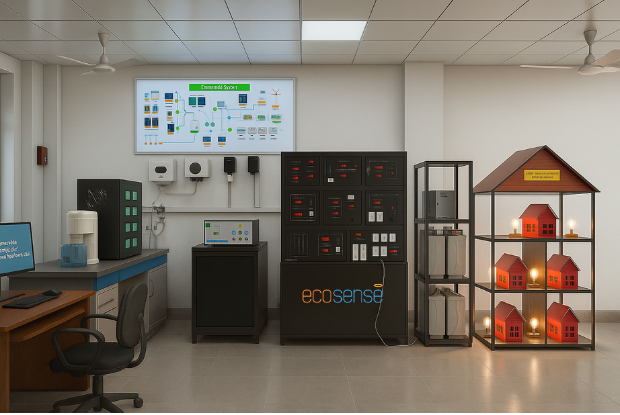Setting Up a Green Hydrogen Lab: What Colleges and Universities Need to Know
As global momentum builds around clean energy transitions, green hydrogen has emerged as a key pillar of the sustainable energy ecosystem. With governments, industries, and research institutions investing heavily in hydrogen technologies, the demand for a skilled workforce is rising rapidly. Academic institutions in India and beyond now face a timely opportunity—and responsibility—to integrate hydrogen education into their engineering and science curricula.
One of the most effective ways to build this capacity is through a dedicated Green Hydrogen Lab. But setting one up involves more than procuring a few devices. It requires a thoughtful blend of technology, pedagogy, and safety standards tailored to academic environments.
In this blog, we explore what colleges and universities need to consider before establishing a green hydrogen lab—and how doing so can position them at the forefront of clean energy education.
Why a Green Hydrogen Lab?
Hydrogen education is not just theoretical anymore. With national policies like the National Green Hydrogen Mission in India, the ecosystem is evolving quickly. Companies, startups, and research agencies are all looking for graduates who understand the hydrogen value chain.
A dedicated lab helps institutions:
· Equip students with hands-on skills across electrolysis, storage, and fuel cells
· Support R&D and innovation in hydrogen technologies
· Align with future-ready curricula in sustainable energy
· Strengthen partnerships with government and industry
In short, a green hydrogen lab turns students from passive learners into active contributors to India’s clean energy future.
Key Elements of a Green Hydrogen Lab
While each lab should be tailored to its objectives and budget, here are the foundational components that most institutions require:
1. Water Purification Module
High-purity water is a must for electrolyzers. A robust purification unit filters and deionizes water, ensuring long-term electrolyzer performance and experiment accuracy.
2. Electrolyzer System
The heart of the lab, an electrolyzer splits water into hydrogen and oxygen using electricity. Institutions may start with compact educational-grade electrolyzers before scaling up to research-grade systems.
3. Gas Handling & Storage Units
Once generated, hydrogen and oxygen need to be safely handled, measured, and optionally stored. Labs often include visible flow meters and gas collection systems with safety valves.
4. Fuel Cell Stack
A fuel cell closes the loop by converting hydrogen back to electricity. This allows students to explore real applications like powering LEDs, motors, or small circuits.
5. Control & Monitoring Panel
Modern labs incorporate sensor-based monitoring to observe gas flows, voltage, current, and system efficiencies—offering a rich learning experience through data.
6. Safety and Compliance Systems
Hydrogen is flammable and must be managed with care. A well-designed lab includes leak detectors, ventilation systems, and safety interlocks as per relevant standards.
What Can Students Learn?
A green hydrogen lab isn’t just about showcasing hardware. It’s a complete learning environment. With the right experiments and training programs, students and researchers can:
· Understand core concepts like electrolysis efficiency, fuel cell dynamics, and hydrogen storage
· Gain practical experience operating real hydrogen systems
· Conduct data analysis and performance comparisons
· Learn safety protocols and emergency procedures
· Simulate clean energy systems using hydrogen as a storage or transport medium
Such labs are also ideal platforms for minor and major student projects, MTech dissertations, and doctoral research.
Suggested Experiments
To get started, here are a few example experiments you can run in a standard educational hydrogen lab:
· Analyze Faraday and energy efficiency of an electrolyzer
· Observe the effect of temperature and pressure on hydrogen generation
· Study the I-V and P-V curves of a PEM fuel cell
· Design and operate a basic hydrogen-powered DC microgrid
· Detect and respond to simulated hydrogen leaks
· Compare different water purification methods for electrolysis input
Labs can be scaled modularly to accommodate undergraduate teaching, advanced research, and industry training.
Institutional Benefits
By setting up a hydrogen lab, your institution gains much more than new equipment. It creates a competitive edge in education, research, and reputation.
Academic:
· Integrate with AICTE-recommended curricula
· Boost your NAAC/NBA rankings by enhancing practical learning infrastructure
· Enable faculty-led research projects and publications
· Encourage startup incubation and tech transfer
Industry:
· Serve as a training hub for technicians and engineers
· Provide pilot testing facilities for hydrogen-based solutions
· Partner with government and private sector on skill development initiatives
Societal:
· Promote clean energy awareness and job readiness
· Contribute to India’s net-zero and energy independence goals
Choosing the Right Technology Partner
A successful hydrogen lab setup requires more than just sourcing equipment. You need a partner who understands:
· The academic learning environment
· Scalable lab design with curriculum alignment
· Integration of safety protocols
· Post-installation training, documentation, and support
Look for solution providers with a track record in educational technology, relevant certifications, and a collaborative approach to project execution.
The Future is Hydrogen-Ready
With growing support for hydrogen across policies, investments, and innovation, institutions that adopt hydrogen education today will lead the talent pipeline tomorrow. A thoughtfully planned Green Hydrogen Lab not only empowers students with emerging skills but also amplifies your institution’s role in shaping a low-carbon economy.
As green hydrogen gains ground in mobility, industry, and energy storage, your lab becomes a critical launchpad for the future of clean tech.
Ready to Get Started?
If you’re planning to set up a green hydrogen lab or want to explore how your college or university can take the lead in clean energy education, we are here to help. From lab design and component integration to custom training programs and long-term support, our team brings deep experience in academic clean-tech infrastructure.
Let us build the future of hydrogen—together

